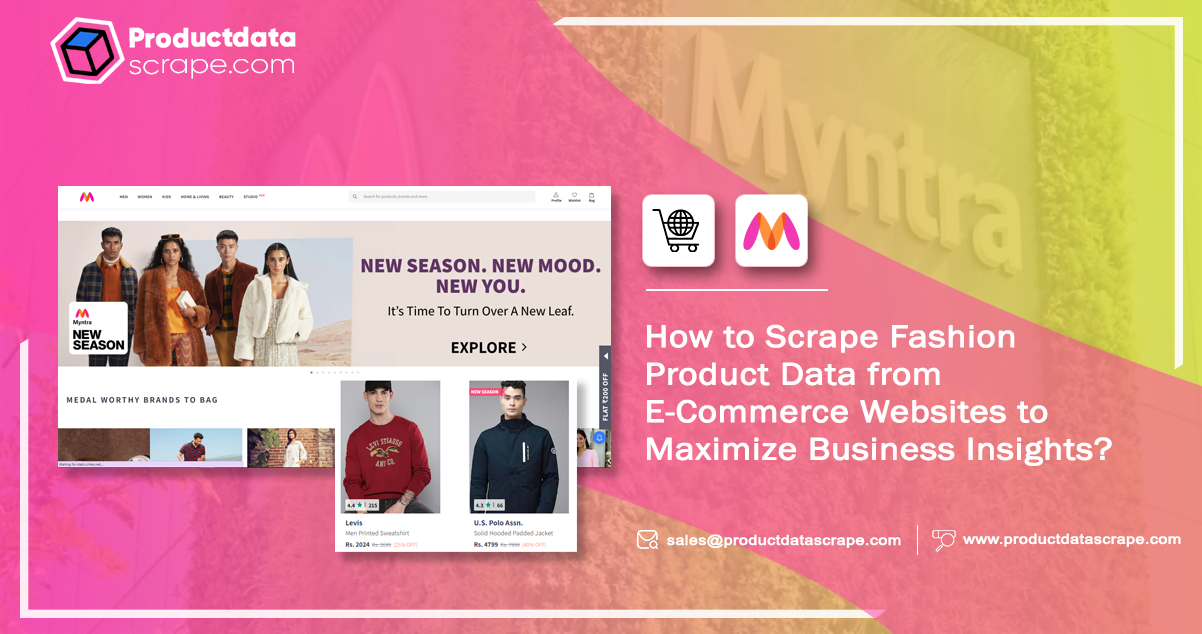
The rising demand for Machine Learning and AI models has created a need for
diverse and expansive datasets. While numerous readily available datasets exist, creating a
custom dataset is an appealing option. Web scraping comes to mind as a powerful method.
The internet hosts abundant data across various domains, waiting to be
harvested and utilized for training cutting-edge machine learning models. With web scraping e-commerce data, we can tap into this vast resource and gather the data needed for our projects.
In today's fast-paced digital world, e-commerce has become the go-to
destination for shoppers seeking convenience and variety. For fashion enthusiasts, online
platforms offer many choices, from stylish topwear and comfortable bottomwear to fashionable
footwear and chic handbags. However, the fashion industry is a dynamic landscape where trends
change rapidly. To stay competitive and meet customer demands, scrape e-commerce product data to
gather crucial insights into what's hot and what's not.
Scraping Men's and Women's Topwear:
Top wear is a pivotal segment in the vast e-commerce fashion landscape. This
category encompasses an extensive clothing range, including t-shirts, shirts, blouses, and
sweaters. However, by employing web scraping techniques to extract data from e-commerce websites, businesses can gain valuable insights into the prevailing fashion trends. Retailers
can strategically optimize their inventory by tracking the popularity of specific styles,
colors, and brands. This data-driven approach empowers them to stock up on the most sought-after
top wear items and make informed pricing strategies and inventory management decisions.
Gathering Bottomwear Insights:
Bottomwear, which includes jeans, trousers, skirts, and shorts, constitutes another
indispensable facet of the fashion industry. Through web scraping clothing data, e-commerce
retailers can effectively monitor customer preferences and discern which types of bottomwear are
currently in high demand and which might be experiencing a decline in popularity. Analyzing this
data gives businesses a dynamic understanding of market trends and consumer expectations. With
such insights, retailers can proactively adjust their product offerings to align with shifting
preferences, enhancing their competitiveness.
Tracking Footwear Trends:
Footwear is a continuously evolving category within the fashion domain,
characterized by its ever-changing styles, sizes, and brands. Hence, leveraging web scraping
footwear data capabilities, e-commerce businesses can closely monitor the latest trends in shoe
fashion. It includes staying informed about which shoe styles capture customers' attention,
which sizes are in demand, and which brands are currently favored. Such real-time insights are
invaluable for ensuring that the right footwear products are readily available to meet customer
demand. This proactive approach to tracking and adapting to footwear trends enables businesses
to remain competitive in this dynamic market.
Chic Handbags and Accessories:
Handbags and accessories, including belts, scarves, and hats, serve as the finishing
touches that complete a stylish ensemble. Through e-commerce data scraping techniques applied to
fashion-related websites, e-commerce retailers can gain deep insights into the designs and
brands that resonate with shoppers. This knowledge empowers businesses to curate collections in
sync with the latest fashion trends, thus enhancing their appeal to consumers. By staying
attuned to what captures the attention of fashion enthusiasts, retailers can make informed
decisions about selecting and presenting chic handbags and accessories, creating a well-rounded
and fashionable product offering.
In essence, web scraping has emerged as an indispensable tool for e-commerce
businesses operating in the dynamic realm of fashion retail. It enables these retailers to stay
agile, responsive, and competitive by harnessing real-time insights into topwear, bottomwear,
footwear, handbags, and accessories. This data-driven approach helps businesses meet consumer
expectations and empowers them to proactively shape and optimize their product portfolios in
line with ever-evolving fashion trends.
List of Data Fields
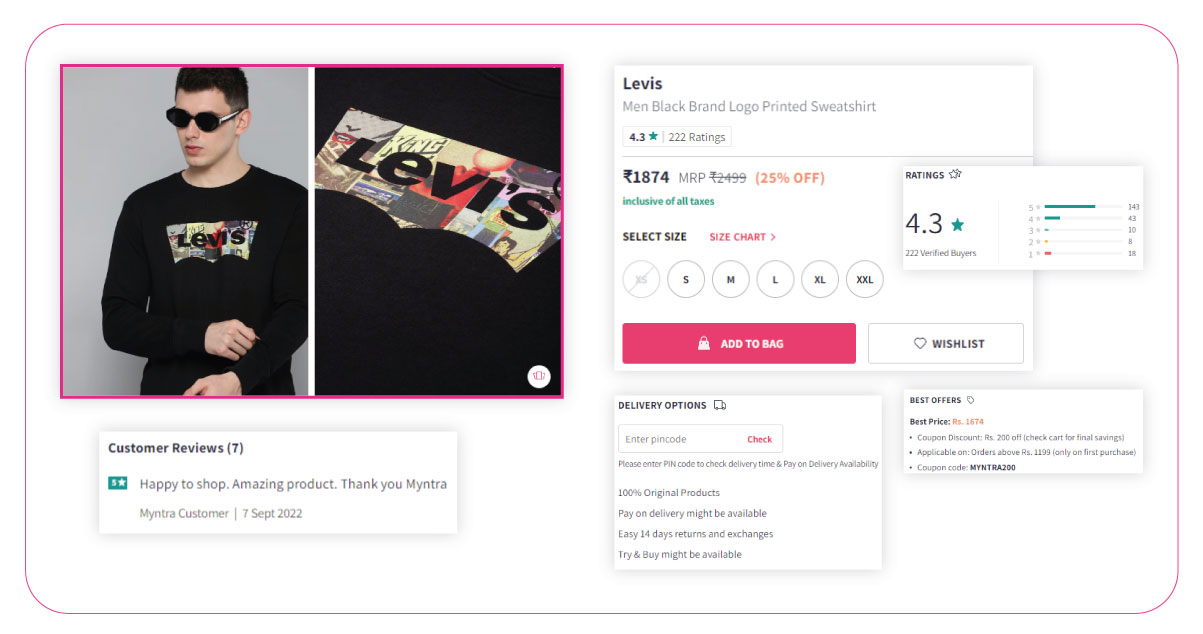
- Product Name
- Product Description
- Product Variants
- Shipping Information
- Product Weight/ Shipping Weight
- Product Reviews
- Ratings
- Brand Manufacturer
- Discounts And Offers
- Model Number
- Offered Price
- Multiple Seller Details And Price Features
- List Price
About Web Scraping in eCommerce
Web scraping is an essential tool in eCommerce, enabling retailers to gather crucial insights into online consumer behavior. It empowers businesses to track user searches, identify emerging trends, and discover opportunities for targeted online promotions. By harnessing web scraping retail data, retailers can align their marketing strategies with customers' genuine preferences.
In a vast sea of eCommerce stores, manually extracting price data from competitors is impractical. It is where e-commerce data scraping services shine, particularly in comprehensive data analytics. eCommerce web scrapers are pivotal in deciphering critical insights, including consumer preferences and competitor pricing strategies. From its inception, web scraping has been a driving force behind the success of eCommerce giants like eBay, Amazon, Walmart, Aliexpress, Google, and many others.
Web scraping is a versatile tool applicable to eCommerce site owners, marketing firms, and brand communities. With a reliable e-commerce data scraper, you can secure valuable leads, outshine competitors, optimize pricing strategies, boost revenue, and even cultivate trusted partnerships. It's valuable in navigating and thriving within the ever-evolving eCommerce landscape.
Examples of Some e-commerce Websites
SKU, which stands for "Stock Keeping Unit," represents a distinctive alphanumeric
code or identifier utilized by retailers and businesses for monitoring and overseeing their
inventory. SKUs assume a pivotal role in the realm of inventory management and data analysis.
They serve as the foundation for monitoring stock flow, streamlining point-of-sale transactions,
and enhancing the efficiency of supply chain operations.
Amazon: Amazon is a global powerhouse in the e-commerce industry, and selling clothing, footwear, and related products on this platform has become a thriving business for countless sellers. With a wide range of product categories, including men's, women's, and children's apparel, footwear, and accessories, Amazon provides a vast marketplace that connects sellers with a massive global customer base. Scrape Amazon e-commerce data for inventory management.
Myntra: Myntra is one of India's leading e-commerce platforms specializing in fashion and lifestyle products. Founded in 2007, Myntra has become a go-to destination for online shopping, offering a wide range of clothing, footwear, accessories, and beauty products for men, women, and children. The platform features an extensive catalog of domestic and international brands, making it a preferred choice for fashion enthusiasts. Thus, scrape Myntra e-commerce data to understand the latest trends.
Flipkart: Flipkart is one of India's largest and most prominent e-commerce companies. Founded in 2007 by Sachin Bansal and Binny Bansal (unrelated), Flipkart has played a pivotal role in revolutionizing online shopping in India. Initially starting as an online bookstore, Flipkart has since expanded to become a comprehensive online marketplace, offering various products, including electronics, fashion, home goods, groceries, and more. Scrape Flipkart e-commerce data to perform competitive analysis.
Here, we will take an example of Myntra and describe the steps of web scraping e-commerce product data.
Step 1: Module and Dependency Importation

Furthermore, alongside the mentioned Python libraries, you'll require ChromeDriver, available for installation directly at https://chromedriver.chromium.org/. Ensure it matches your current Chrome version.
Step 2: Launch Myntra.com with Selenium


The provided code snippet will load the URL, initiating a Chrome window displaying the response page.
Step 3: Perform a Search
On the displayed response page, you'll notice a search bar. In this section, we'll input text into the search bar and initiate a click action to fetch search results.

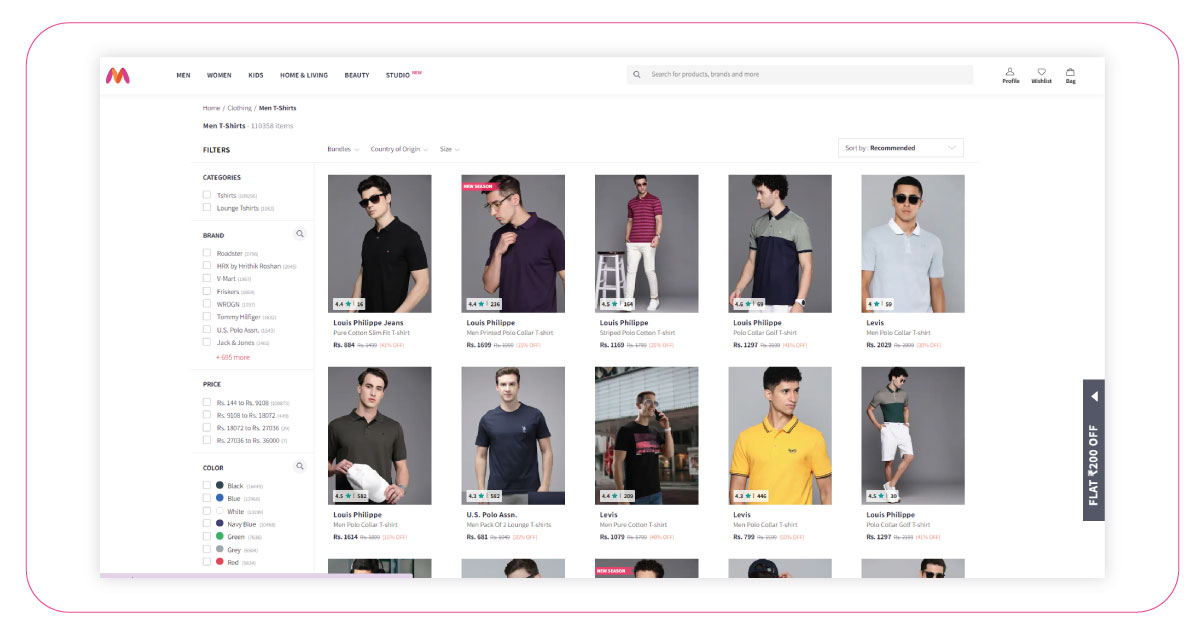
Step 4: Extract URLs of Desired Objects
If your dataset collection goal is limited to thumbnail retrieval, you can acquire them directly from this response page. However, if you aim to gather metadata in addition to the images, you can proceed as follows.
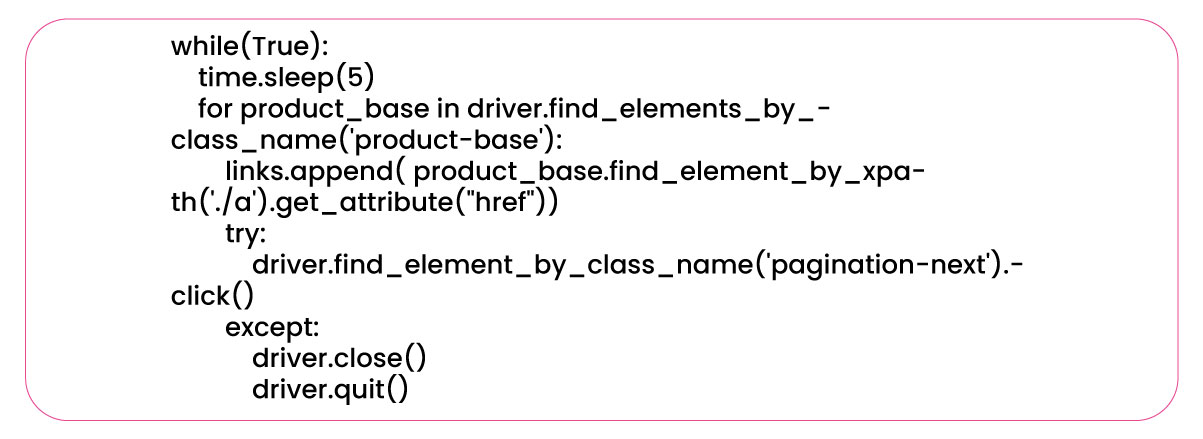
The provided code retrieves all product links on the response page. It then checks for a "NEXT" button; if found, it navigates to the next page and repeats the process. Otherwise, it terminates the driver connection.
Step 5: Data Retrieval
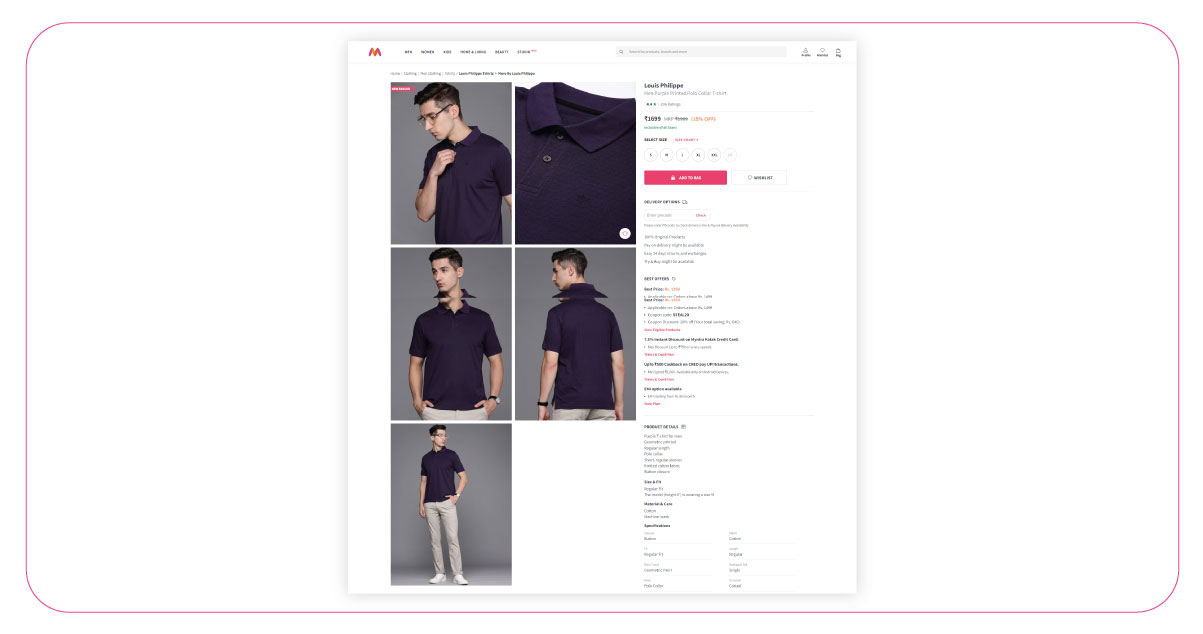
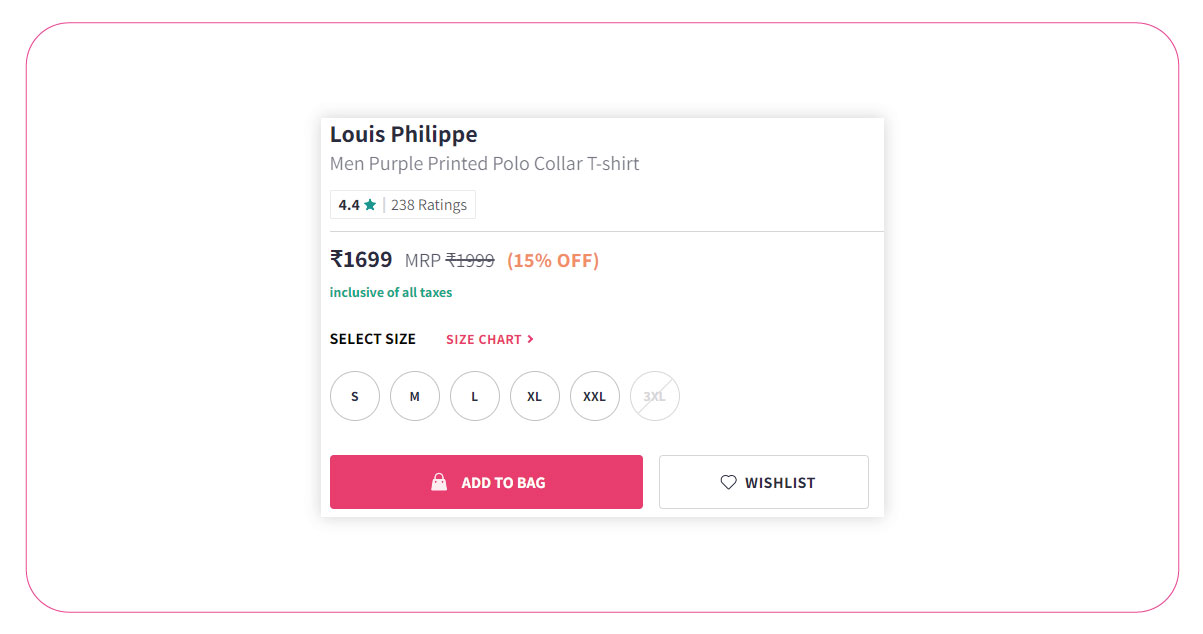
In this step, we extract the product name, title, and price using the purchase link obtained in Step 4.
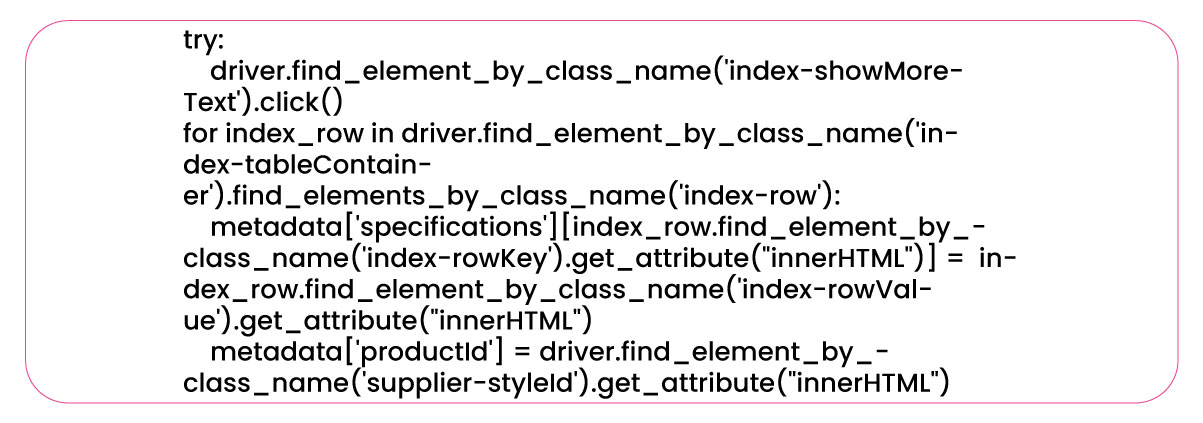
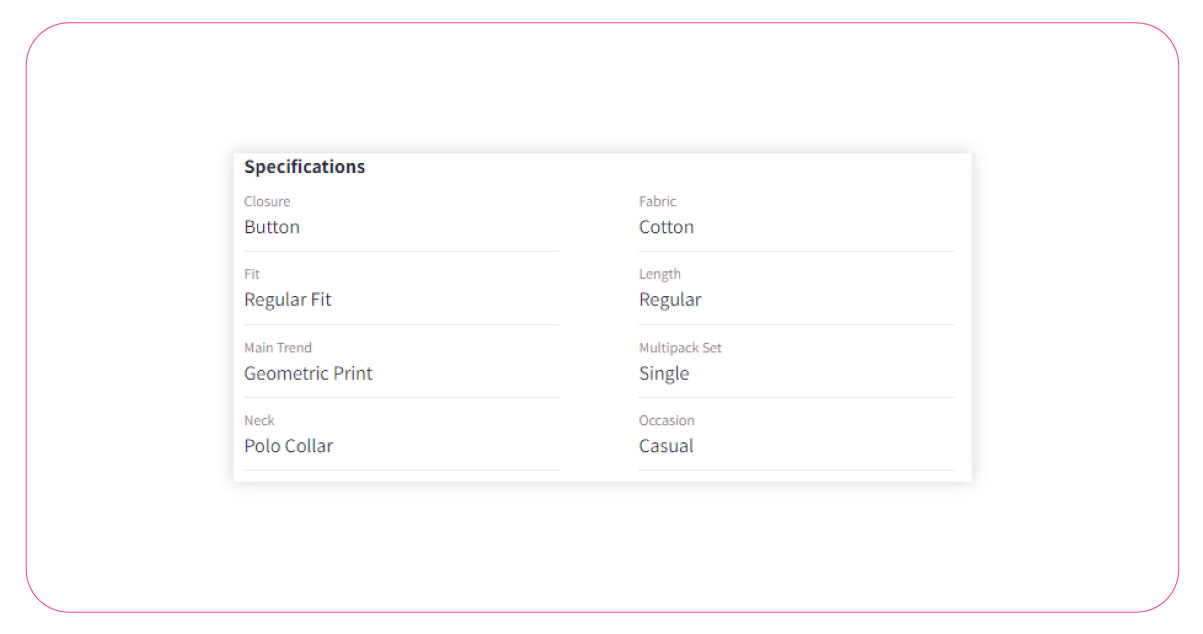
In this code snippet, we attempt to load all the product specifications and subsequently extract the key-value pairs to incorporate the metadata.


To utilize state-of-the-art models in Computer Vision and Deep Learning, image data of the product is essential, and it's available through this code snippet.

Ultimately, save the data in the form of a JSON file.
Product Data Scrape is committed to upholding the utmost standards of ethical
conduct across our Competitor Price Monitoring Services and
Mobile App Data Scraping operations.
With a global presence across multiple offices, we meet our customers' diverse needs with
excellence and integrity.















































.webp)






